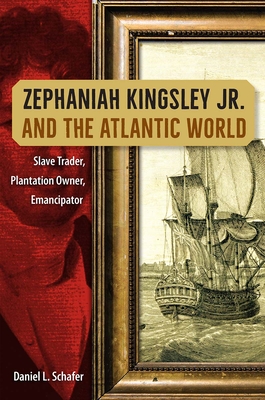Zephaniah Kingsley Jr. and the Atlantic World: Slave Trader, Plantation Owner, Emancipator

Zephaniah Kingsley Jr. and the Atlantic World: Slave Trader, Plantation Owner, Emancipator
Book Awards, Silver Medal for Florida NonfictionFlorida
Historical Society Charlton Tebeau Award
Florida
Historical Society Stetson Kennedy Award
A biography of a controversial patriarch of a mixed-race family
A
controversial figure for his views on manumission and his unorthodox
marital arrangements, Zephaniah Kingsley Jr. (1765-1843) is mostly known
today for his Fort George Island plantation in Duval County, Florida,
now a National Park Service site, and for his 1828 pamphlet, A Treatise on the Patriarchal System of Society,
that advocated just and humane treatment of enslaved persons, liberal
emancipation policies, and granting rights to free persons of color.
Paradoxically, his fortune came from the purchase, sale, and labor of
enslaved Africans.
In this penetrating biography,
Daniel Schafer vividly chronicles Kingsley's evolving thoughts on race
and slavery, exploring his business practices and his private life.
Kingsley fathered children by several enslaved women, then freed and
lived with them in a unique mixed-race family. One of the women--the only
one he acknowledged as his "wife" though they were never formally
married--was Anta Madgigine Ndiaye (Anna Kingsley), a member of the
Senegalese royal family, who was captured in a slave raid and purchased
by Kingsley in Havana, Cuba.
A ship captain, Caribbean
merchant, and Atlantic slave trader during the perilous years of
international warfare following the French Revolution, Kingsley sought
protection under neutral flags, changing allegiance from Britain to the
United States, Denmark, and Spain. Later, when the American acquisition
of Florida brought rigid race and slavery policies that endangered the
freedom of Kingsley's mixed-race family, he responded by moving his
"wives" and children to a vast agricultural settlement in Haiti that he
established for free persons of color.
Kingsley's
assertion that color should not be a "badge of degradation" made him
unusual in the early Republic. His unique life is revealed in this
fascinating reminder of the deep connections between Europe, the
Caribbean, and the young United States.
PRP: 167.09 Lei
Acesta este Pretul Recomandat de Producator. Pretul de vanzare al produsului este afisat mai jos.
142.03Lei
142.03Lei
167.09 LeiLivrare in 2-4 saptamani
Descrierea produsului
Book Awards, Silver Medal for Florida NonfictionFlorida
Historical Society Charlton Tebeau Award
Florida
Historical Society Stetson Kennedy Award
A biography of a controversial patriarch of a mixed-race family
A
controversial figure for his views on manumission and his unorthodox
marital arrangements, Zephaniah Kingsley Jr. (1765-1843) is mostly known
today for his Fort George Island plantation in Duval County, Florida,
now a National Park Service site, and for his 1828 pamphlet, A Treatise on the Patriarchal System of Society,
that advocated just and humane treatment of enslaved persons, liberal
emancipation policies, and granting rights to free persons of color.
Paradoxically, his fortune came from the purchase, sale, and labor of
enslaved Africans.
In this penetrating biography,
Daniel Schafer vividly chronicles Kingsley's evolving thoughts on race
and slavery, exploring his business practices and his private life.
Kingsley fathered children by several enslaved women, then freed and
lived with them in a unique mixed-race family. One of the women--the only
one he acknowledged as his "wife" though they were never formally
married--was Anta Madgigine Ndiaye (Anna Kingsley), a member of the
Senegalese royal family, who was captured in a slave raid and purchased
by Kingsley in Havana, Cuba.
A ship captain, Caribbean
merchant, and Atlantic slave trader during the perilous years of
international warfare following the French Revolution, Kingsley sought
protection under neutral flags, changing allegiance from Britain to the
United States, Denmark, and Spain. Later, when the American acquisition
of Florida brought rigid race and slavery policies that endangered the
freedom of Kingsley's mixed-race family, he responded by moving his
"wives" and children to a vast agricultural settlement in Haiti that he
established for free persons of color.
Kingsley's
assertion that color should not be a "badge of degradation" made him
unusual in the early Republic. His unique life is revealed in this
fascinating reminder of the deep connections between Europe, the
Caribbean, and the young United States.
Detaliile produsului









